"Which of these Two was the Serpent, which the Eve, in this STEUER-SCHEIN Tree of Knowledge, that grew in the middle of Paradise, remains entirely uncertain. Hirsch, of course, says it was Voltaire; Voltaire (not aware that DOCUMENT SECOND remained in existence) had denied that his Hirsch business was in any way concerned with STEUER;--and must have been a good deal struck, when DOCUMENT SECOND came to light; though what could he do but still deny! Hirsch asserts himself to have objected the 'illegality, the King's anger;' but that Voltaire answered in hints about his favor with the King; 'about his power to make one a Court-Jeweller,' if he liked; and so at last tempted the baby innocence of Hirsch;--for the rest, admits that the Steuer-Notes were expected to yield a Profit--of 35 per cent:--and, in fact, a dramatic reader can imagine to himself dialogue enough, at different times, going on, partly by words, partly by hint, innuendo and dumb-show, between this Pair of Stage-Beauties. But, for near a fortnight after DOCUMENT FIRST, there is nothing dated, or that can be clearly believed,--till, "MONDAY, 23d NOVEMBER, 1750. It is credibly certain the Jew Hirsch came again, this day, to the Royal Schloss of Potsdam, to Voltaire's apartment there [right overhead of King Friedrich's, it is!]--where, after such dialogue as can be guessed at, there was handed to Hirsch by Voltaire, in the form of Two negotiable Bills, a sum of about 2,250 pounds; with which the Jew is to make at once for Dresden, and buy Steuer-Scheine. [Hirsch's Narrative, in Preface to <italic> Tantale en Proces, <end italic> p. 340.]
Steuer-Scheine without fail: 'but in talking or corresponding on the matter, we are always to call them FURS or DIAMONDS,'--mystery of mysteries being the rule for us. This considerable sum of 2,250pounds may it not otherwise, contrives Voltaire, be called a 'Loan'
to Jeweller Hirsch, so obliging a Jeweller, to buy 'Furs' or 'Diamonds' with? At a gain of 35 per 100 Pieces, there will be above 800 pounds to me, after all expenses cleared: a very pretty stroke of business do-able in few days!"--"Monday, 23d November:" The beautiful Wilhelmina, one remarks, is just ****** her packages; right sad to end such a Visit as this had been! Thursday night, from her first sleeping-place, there is a touching Farewell to her Brother;--tender, melodiously sorrowful, as the Song of the Swan. [Wilhelmina to Friedrich, "Brietzen, 26th November, JOUR FUNESTE POUR MOI" (<italic> OEuvres de Frederic, <end italic> xxvii. i. 197).] To Voltaire she was always good;always liked Voltaire. Voltaire would be saying his Adieus, in state, among the others, to that high Being,--just in the hours while such a scandalous Hirsch-Concoction went, on underground!
"As to the Two Bills and Voltaire's security for them, readers are to note as follows. Bill FIRST is a Draft, on Voltaire's Paris Banker for 40,000 livres (about 1,600 pounds), not payable for some weeks: 'This I lend you, Monsieur Hirsch; mind, LEND you,--to buy Furs!' 'Yes, truly, what we call Furs;--and before the Bill falls payable, there will be effects for it in Monseigneur de Voltaire's hand; which is security enough for Monseigneur.' The SECOND Bill, again"--Truth is, there were in succession two Second Bills, an INTENDED-Second (of this same Monday 23d), which did not quite suit, and an ACTUAL-Second (two days later), which did. INTENDED-Second Bill was one for 4,000 thalers (about 600 pounds), drawn by Voltaire on the Sieur Ephraim,--a very famous Jew of Berlin now and henceforth, with whom as money-changer, if not yet otherwise (which perhaps Ephraim thinks unlucky), Voltaire, it would seem, is in frequent communication. This Bill, Ephraim would not accept;told Hirsch he owed M. de Voltaire nothing; "turned me rudely away," says Hirsch (two of a trade, and no friends, he and I!)--so that there is nothing to be said of this Ephraim Bill; and except as it elucidates some dark portions of the whirlpools, need not have been noticed at all. "Hirsch," continues my Authority, "got only Two available Bills; the first on Paris for 1,600 pounds, payable in some weeks; and, after a day or two, this other: The ACTUAL BILL SECOND; which is a Draft for 4,430 thalers (about 650pounds), by old Father Hirsch, head of the Firm, on Voltaire himself:--'Furs too with that, Monsieur Hirsch, at the rate of 35per piece, you understand?' 'Yea, truly, Monseigneur!'--Draft accepted by Voltaire, and the cash for it now handed to Hirsch Son:
the only absolutely ready money he has yet got towards the affair.
"For these Two Bills, especially for this Second, I perceive, Voltaire holds borrowed jewels (borrowed in theatrical times, or partly bought, from the Hirsch Firm, and not paid for), which make him sure till he see the STEUER Papers themselves.--(And now off, my good Sieur Hirsch; and know that if you please ME, there are--things in my power which would suit a man in the Jeweller and Hebrew line!' Hirsch pushes home to Berlin; primed and loaded in this manner; Voltaire naturally auxious enough that the shot may hit. Alas, the shot will not even go off, for some time:
an ill omen!
"SUNDAY, 29th NOVEMBER, Hirsch, we hear, is still in Berlin.
Fancy the humor of Voltaire, after such a week as last! TUESDAY, December 1st) Hirsch still is not off: 'Go, you son of Amalek!'
urges Voltaire; and sends his Servant Picard, a very sharp fellow, for perhaps the third time,--who has orders now, as Hirsch discovers, to stay with him, not quit sight of him till he do go.
[Hirsch's Narrative; see Voltaire's Letter to D'Arget (<italic>













